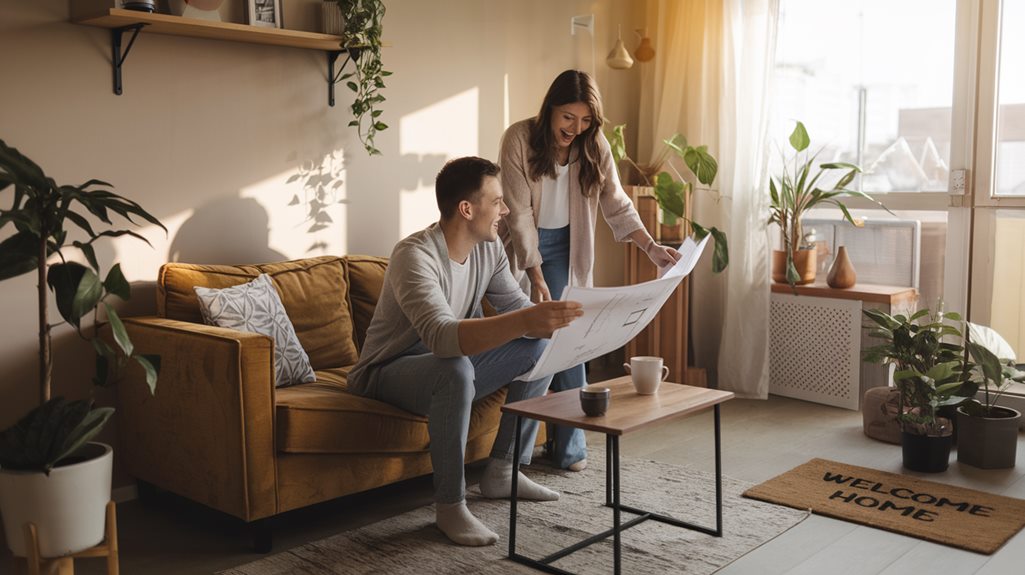When you want to buy your first home, it's important to look at your money situation. Check your credit score and see how much money you owe compared to how much you make.
Make a budget that includes your down payment and extra costs that might come up. Get pre-approved for a mortgage. This helps you know how much you can spend.
Look at different mortgage options and compare their rates to find the best one for you. It's a good idea to hire a real estate agent who knows what they are doing. They can help with the paperwork and talk to sellers for you.
Explore different neighborhoods to find the best one for you. Look for things like parks, safety, and if the area will grow in the future. Think about how much you can sell the house for later on.
Pay close attention to closing costs and try to negotiate them.
Finally, get ready for moving day ahead of time. Following these steps can help you buy a house successfully!
Ready to start building equity in your own Michigan home? Get your personalized home loan quote today.
Assess Your Financial Health

Before you buy a home, it's important to look closely at your money situation. Your credit score is like a report card for your finances. A good score helps you get a mortgage and better interest rates. This means it's easier to buy a home.
Next, check how much money you owe compared to how much you earn. This is called your debt-to-income ratio. Lenders use this to see if you can pay your mortgage along with other bills.
As you get ready to buy a home, try to make your credit score better and pay down any debts. Paying off what you owe and not taking on new debts is a smart move.
A strong financial situation gives you peace of mind and helps you feel secure. Remember, when you buy a home, you're not just getting a house; you're also investing in your future!
Michigan residents, unlock the door to your new home. Request your home loan quote from Treeside Financial today.
Determine Your Budget
Making a budget is super important when buying a home. First, think about how much money you can put down. This is called a down payment. Look at your money and see what you can really afford. Don't spend too much! Use some simple tools to keep track of your money and savings. This will help you see how much you can spend on your new home.
Remember, your budget isn't just for the price of the house. You also need to think about other costs. This includes closing costs, moving costs, and any fixes you might want to do. If you pay attention to these details now, you'll feel less stressed later.
Get Pre-Approved for a Mortgage

Now that you have your budget ready, it's time to get pre-approved for a mortgage. This means a lender will check your finances to see if you can borrow money to buy a home.
Getting pre-approved shows sellers that you're serious about buying. It also helps you know how much you can spend. Here are some things you'll need:
- Proof of Income: Lenders want to see that you have a steady job and earn money.
- Credit Score Check: Know your score and fix any problems if you can.
- Debt-to-Income Ratio: This tells lenders how much of your money goes to paying off debts.
- Employment Verification: Lenders like to see that you have a stable job.
- Understanding Mortgage Terms: Learn the difference between fixed and variable rates.
When you get pre-approved, you'll feel more confident. It can also help you stand out when looking for a home.
Research Mortgage Options
When you look for a mortgage, it's important to check different interest rates. This helps you find the best deal for your money.
Think about the good and bad sides of fixed loans and adjustable loans. This will help you choose a payment plan that works for your future plans.
Compare Interest Rates
Buying a home is a big deal! One important step is to compare interest rates. This can help you save money in the long run. Here are some easy steps to help you out:
- Learn about interest rates: Keep an eye on how rates change. This way, you'll know the best time to get a good rate.
- Look at different lenders: Don't just focus on the interest rate. Check the loan terms and any extra fees, too.
- Get quotes from several lenders: This helps you ask for better deals.
- Read reviews from other customers: Good lenders usually have happy customers.
- Talk to a mortgage broker: They can give you special advice and help you find great deals.
Fixed vs. Adjustable Loans
When you're looking for a mortgage, you have to pick between a fixed-rate loan and an adjustable-rate loan. A fixed-rate loan means you pay the same amount every month. This makes it easy to plan your budget and gives you peace of mind. On the other hand, an adjustable-rate loan starts with lower payments, but the amount can change. This can make it harder to plan your money.
| Loan Type | Key Features |
|---|---|
| Fixed-Rate Loan | Same payments, steady, no surprises |
| Adjustable-Rate | Lower starting payments, can change later |
Think about what matters more to you: being steady or having some flexibility? If you worry about changing interest rates, a fixed-rate loan might be best. But if you're okay with some changes and want lower payments at first, look at an adjustable-rate loan. Make your choice based on your money goals. It can help you feel good in your new home!
Hire a Real Estate Agent

Buying a house can feel scary, but getting a real estate agent can help a lot. A good agent will be there for you every step of the way. They'll make things easier and help you feel ready.
Here are some things they do:
- Help you fill out important papers
- Talk to people for you when making offers
- Share helpful tips about the market
- Introduce you to people you can trust
- Make sure you understand how they get paid
Agents usually get paid a small part of the money from selling the house. But don't worry, this is often included in what the seller pays.
A good agent knows a lot about the area and can be a big help. You aren't just buying a house; you're finding a place to belong. With a good agent, you won't be alone on this journey.
Understand Home Inspections
When you buy a house, it's really important to understand home inspections. You want your new home to be safe and not cause you money problems later.
Start by learning about a home inspection checklist. This list should cover important parts like the roof, plumbing, electrical systems, and the foundation. Knowing about common problems, like water damage or bad wiring, can help you avoid trouble later.
Don't be afraid to ask questions during the inspection because this will be your home! It's smart to hire a good inspector so they don't miss anything important.
Explore Neighborhoods

When you start looking to buy your first home, exploring different neighborhoods is super important. The feel of a neighborhood can change how you live and how happy you are. Here are some things to think about:
- Fun places nearby: Check for stores, gyms, and places to have fun.
- Safety: Look into how safe the area is and if there are programs to help keep it that way.
- Schools: Good schools can help home values, even if you don't have kids.
- Future building plans: See if there are new projects coming that might make the area better.
- Home prices: Look at how prices are changing to see if it's a good investment.
Also, think about how long it takes to get to work, look at the people living there to feel the community, and enjoy the local culture.
Don't forget to check how close parks are and if there's public transportation to make getting around easier.
Consider Future Resale Value
When you check out different neighborhoods, it's important to think about how much money you can get if you ever sell your home. Knowing what houses are worth today can help you make a smart choice for the future.
Look for things in a house that you'll like now but that other people will want later too. Good spots are close to schools and easy to get to on buses or trains.
Are there new parks or stores coming soon? These can make the area more popular. Remembering these things can help your home be worth more later.
Review Closing Costs

When you decide to buy a home, it's important to look at the extra costs called closing costs. These costs can surprise you if you're not careful. Knowing about them can help make your home buying go smoothly.
Here are some things to check:
- Loan origination fees: You can talk to your lender about these fees to see if you can pay less.
- Appraisal costs: Make sure these costs are fair and match what homes usually cost in your area.
- Title insurance: Look around to find the best prices to keep your home safe.
- Inspection fees: Check that you aren't paying too much for important checks on the home.
- Escrow fees: Learn what the usual fees are and see if you can negotiate for a better deal.
Prepare for Moving Day
Now that you understand the closing costs, let's think about moving day!
To make moving easier, a good checklist can help a lot. First, think about what you need the most and pack those things first. Make sure to write on the boxes so you know what's inside. You can even use colors for different rooms to make unpacking easier.
Don't forget to book movers early, because they get busy. And remember to tell important people your new address.







